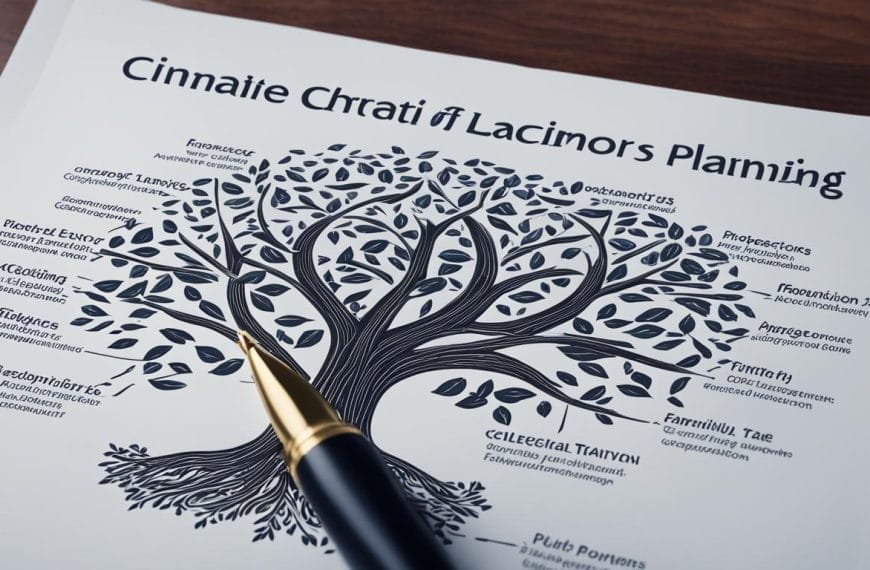Estate planning is a vital process that involves planning for the distribution of your property and assets after your death. It’s important to ensure that your testamentary dispositions accurately reflect your wishes. To navigate the complexities of estate planning and writing wills, it’s crucial to consult the right professionals – legal counsel, attorneys, financial advisors, estate planners, and probate lawyers.
By consulting these experts, you can rest assured that your estate planning will be done effectively and in compliance with the relevant laws. Legal counsel and attorneys will provide expert guidance on the legal aspects of estate planning and ensure that your wills are properly drafted. Financial advisors can offer valuable insights into managing and protecting your assets, while estate planners specialize in creating comprehensive estate plans tailored to your specific needs. In case of the need for estate administration, probate lawyers play a crucial role in facilitating the probate process and ensuring that your wishes are carried out.
Professional assistance in will drafting is highly recommended to avoid errors and ensure that your will is legally sound. Estate planning attorneys possess the necessary legal expertise to accurately draft your will, meeting all the requirements. They guide you in choosing a capable executor who will carry out your wishes effectively. Consulting experts in will drafting will provide peace of mind, knowing that your will is legally valid and will serve its intended purpose.
Consulting the right professionals for your estate planning and will writing needs is essential to protect your assets and provide for your loved ones in the future. By seeking guidance from legal counsel, attorneys, financial advisors, estate planners, and probate lawyers, you’ll be taking the necessary steps to ensure a smooth and successful estate planning journey.
Understanding Estate Planning
Estate planning is a comprehensive process that involves various legal tools and documents to ensure the effective management and transfer of your property and assets. By understanding the different aspects of estate planning, you can make informed decisions about your testamentary dispositions and protect your wealth for the future.
What is Estate Planning?
Estate planning encompasses a range of legal instruments, including wills, trusts, powers of attorney, and living wills. These tools play a vital role in defining how your assets will be distributed, who will manage your affairs, and how medical decisions will be made in case you are unable to make them yourself.
Importance of Estate Planning
Estate planning is essential to ensure that your money and property are distributed according to your wishes. It allows you to minimize taxes, avoid probate, and simplify the transfer of assets to your loved ones. By developing a comprehensive estate plan, you can have peace of mind knowing that your wishes will be carried out and your loved ones will be taken care of.
| Benefits of Estate Planning |
|---|
| 1. Distribution of assets according to your wishes |
| 2. Minimization of estate taxes |
| 3. Avoidance of probate |
| 4. Privacy protection |
| 5. Appointing guardians for children |
Working with Professionals
Consulting professionals who specialize in estate planning, such as attorneys and financial advisors, can provide invaluable guidance throughout the process. They can help you navigate the complex legal requirements, draft legally sound documents, and ensure that your estate plan aligns with your specific goals and wishes.
The Probate Process
Probate is the legal process that validates a will, settles debts, and distributes assets after someone’s passing. Proper estate planning can help avoid or streamline the probate process, reducing costs and ensuring a smoother transition of assets to your beneficiaries.
Who to Consult for Estate Planning
When it comes to estate planning, it is crucial to seek guidance from professionals who specialize in this field. Consulting with legal counsel, attorneys, financial advisors, and estate planners can ensure that your estate planning process is comprehensive and compliant with relevant laws and regulations.
Legal counsel: Estate planning attorneys possess the expertise needed to navigate the legal aspects of estate planning. They can assist in drafting wills, establishing trusts, and ensuring that your estate plan meets all legal requirements.
Financial advisors: Financial advisors play a vital role in managing and protecting your assets. They can provide valuable insights on investment strategies, tax implications, and other financial considerations that can optimize your estate plan’s effectiveness.
Estate planners: Estate planners specialize in developing customized estate plans tailored to your specific needs and goals. They analyze your assets, debts, and family dynamics to create a comprehensive plan that aligns with your objectives and ensures the smooth transfer of your estate.
By consulting these professionals, you can gain personalized advice and assistance throughout the estate planning process, enabling you to make informed decisions and protect your assets for the future.
Comparison of Services
| Professional | Specialization | Services |
|---|---|---|
| Legal Counsel | Estate Planning Attorneys | Legal guidance, will drafting, trust establishment, compliance with laws |
| Financial Advisor | Strategic Financial Consulting | Asset management, investment strategies, tax planning |
| Estate Planner | Comprehensive Estate Planning | Customized estate plans, asset analysis, family dynamics consideration |
The Role of a Probate Lawyer
In the estate planning process and the administration of an estate after someone’s passing, a probate lawyer plays a crucial role. Their expertise and guidance are essential in ensuring that the probate process is carried out smoothly and in accordance with the law.
The probate process involves several important steps, including:
- Validating the will
- Settling the deceased’s debts
- Distributing assets to beneficiaries
- Resolving any disputes that may arise
A competent probate lawyer provides assistance to both executors and beneficiaries throughout the process. They ensure that all legal requirements are met, proper documentation is filed, and the estate is administered in compliance with applicable laws.
By consulting a probate lawyer, individuals can streamline the probate process and ensure that the deceased’s wishes are carried out as intended. The probate lawyer’s expertise in estate administration helps avoid potential pitfalls and delays, maximizing the efficiency and effectiveness of the probate process.
Here is an example of a table showing the key responsibilities of a probate lawyer:
| Responsibilities of a Probate Lawyer |
|---|
| Validate the will |
| Assist in settling the deceased’s debts |
| Oversee the distribution of assets to beneficiaries |
| Resolve disputes among interested parties |
| Ensure compliance with legal requirements |
Consulting a trusted and experienced probate lawyer is crucial to avoid potential legal complications and ensure that the probate process is handled with the utmost care and professionalism.
Benefits of Professional Assistance in Will Drafting
Will drafting is a crucial step in estate planning, and seeking professional assistance can provide numerous benefits. Legal expertise is essential to ensure that your will is accurately drafted, meeting all the necessary legal requirements. Professionals such as estate planning attorneys possess the knowledge and experience to guide you through the process and help you avoid common errors that could render your will invalid.
One crucial aspect is the testamentary capacity, which refers to the legal and mental ability to create a valid will. Professionals can assist you in assessing and ensuring that you have the necessary testamentary capacity to make informed decisions about your estate and beneficiaries.
Proper execution is another critical factor in will drafting. Mistakes in executing a will can lead to its invalidation, causing conflicts and disputes among your loved ones. With the help of professionals, you can ensure that your will is executed properly, adhering to all legal requirements.
Moreover, professionals can provide valuable guidance on selecting an executor. An executor is responsible for administering your estate and carrying out your wishes. Choosing an executor with the appropriate skills, knowledge, and dedication can help ensure that your estate is managed efficiently and in accordance with your instructions.
By consulting experts in will drafting, you can have peace of mind knowing that your will is legally sound and will be executed as intended. Their legal expertise, attention to detail, and understanding of the complexities involved in estate planning can help you navigate potential pitfalls and minimize any errors or challenges that may arise.
Ultimately, professional assistance in will drafting can save you time, provide clarity, and give you confidence that your estate planning is in capable hands. It is a wise investment that can safeguard your legacy and provide for your loved ones according to your wishes.
Benefits of Professional Assistance in Will Drafting:
- Legal expertise ensures accurate and legally compliant will drafting
- Avoid common errors that could invalidate a will
- Assess and ensure testamentary capacity
- Proper execution to prevent conflicts and disputes
- Guidance on selecting a capable executor
- Peace of mind knowing your will is legally sound
Comparative Analysis of Professional Assistance in Will Drafting
| Benefits | Professional Assistance | Self-Drafted Will |
|---|---|---|
| Legal expertise | ✅ | ❌ |
| Avoiding errors | ✅ | ❌ |
| Assessment of testamentary capacity | ✅ | ❌ |
| Proper execution | ✅ | ❌ |
| Guidance in executor selection | ✅ | ❌ |
| Peace of mind | ✅ | ❌ |
Conclusion
Estate planning and will drafting are important steps to ensure the proper management and distribution of your assets. To navigate these complex processes successfully, it is vital to consult professionals who specialize in estate planning, such as legal counsel, attorneys, financial advisors, and estate planners.
Consulting with legal professionals, such as attorneys and legal counsel, ensures that your estate planning is in accordance with the relevant laws and regulations. They provide expert advice and guidance on drafting wills, setting up trusts, and ensuring compliance. Financial advisors offer valuable insights into managing your assets and protecting your financial interests.
Engaging the services of an estate planner can help create a comprehensive estate plan tailored to your specific needs and goals. They can assist in identifying potential tax implications, avoiding common pitfalls, and maximizing the value of your estate. Additionally, consulting a probate lawyer can streamline the probate process and ensure that your wishes are carried out.
Writing wills and planning your estate should not be taken lightly. By consulting professionals in the field, you can minimize errors, navigate complex legal procedures, and ensure that your testamentary dispositions are executed smoothly. Take the necessary steps to consult the right professionals and protect your assets, providing for your loved ones in the future.













